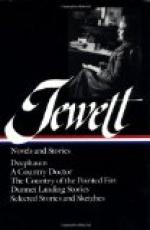“We hoped he’d forget all about it the next day; but he didn’t; and I always thought well of those ladies, they treated him so handsome, and tried to make him enjoy himself. He did eat a great supper; they kep’ a-piling up his plate with everything. I couldn’t help wondering if some of ’em would have put themselves out much if it had been some poor flighty old woman. The cap’n he was as polite as could be, and when Jacob come to walk home with him he kissed ’em all round and asked ’em to meet at his house. But the greatest was—land! I don’t know when I’ve thought so much about those times—one afternoon he was setting at home in the keeping-room, and Statiry was there, and Deacon Abel Pinkham stopped in to see Jacob Gunn about building some fence, and he found he’d gone to mill, so he waited a while, talking friendly, as they expected Jacob might be home; and the cap’n was as pleased as could be, and he urged the deacon to stop to tea. And when he went away, says he to Statiry, in a dreadful knowing way, ’Which of us do you consider the deacon come to see?’ You see, the deacon was a widower. Bless you! when I first come home I used to set everybody laughing, but I forget most of the things now. There was one day, though”—
“Here comes your father,” said Mrs. Snow. “Now we mustn’t let him go by or you’ll have to walk ’way home.” And Aunt Polly hurried out to speak to him, while I took my great bunch of golden-rod, which already drooped a little, and followed her, with Mrs. Snow, who confided to me that the captain’s nephew Jacob had offered to Polly that summer she was over there, and she never could see why she didn’t have him: only love goes where it is sent, and Polly wasn’t one to marry for what she could get if she didn’t like the man. There was plenty that would have said yes, and thank you too, sir, to Jacob Gunn.
That was a pleasant afternoon. I reached home when it was growing dark and chilly, and the early autumn sunset had almost faded in the west. It was a much longer way home around by the road than by the way I had come across the fields.
From a Mournful Villager
Lately I have been thinking, with much sorrow, of the approaching extinction of front yards, and of the type of New England village character and civilization with which they are associated. Formerly, because I lived in an old-fashioned New England village, it would have been hard for me to imagine that there were parts of the country where the Front yard, as I knew it, was not in fashion, and that Grounds (however small) had taken its place. No matter how large a piece of land lay in front of a house in old times, it was still a front yard, in spite of noble dimension and the skill of practiced gardeners.
There are still a good many examples of the old manner of out-of-door life and customs, as well as a good deal of the old-fashioned provincial society, left in the eastern parts of the New England States; but put side by side with the society that is American rather than provincial, one discovers it to be in a small minority. The representative United States citizen will be, or already is, a Westerner, and his instincts and ways of looking at things have certain characteristics of their own which are steadily growing more noticeable.




